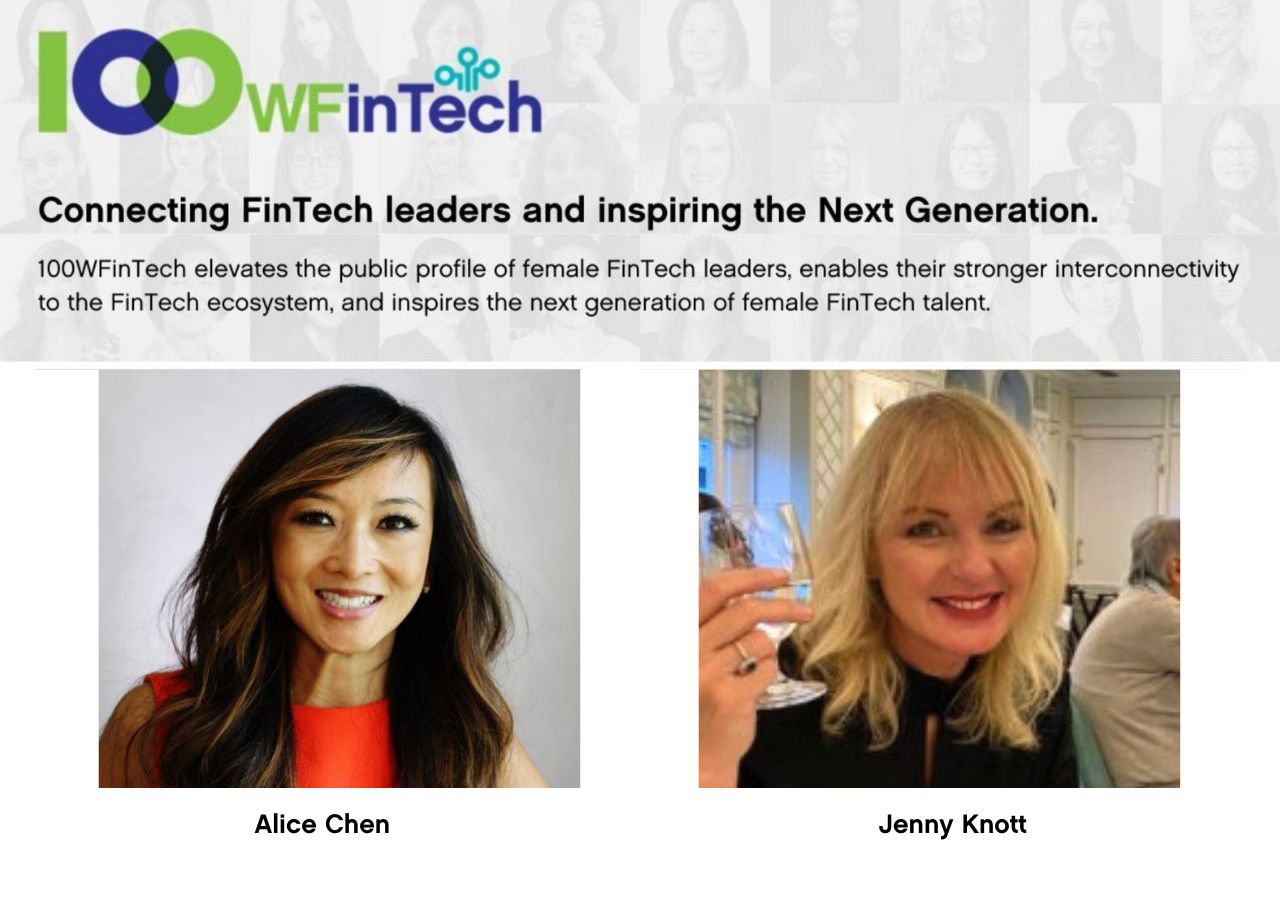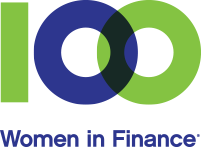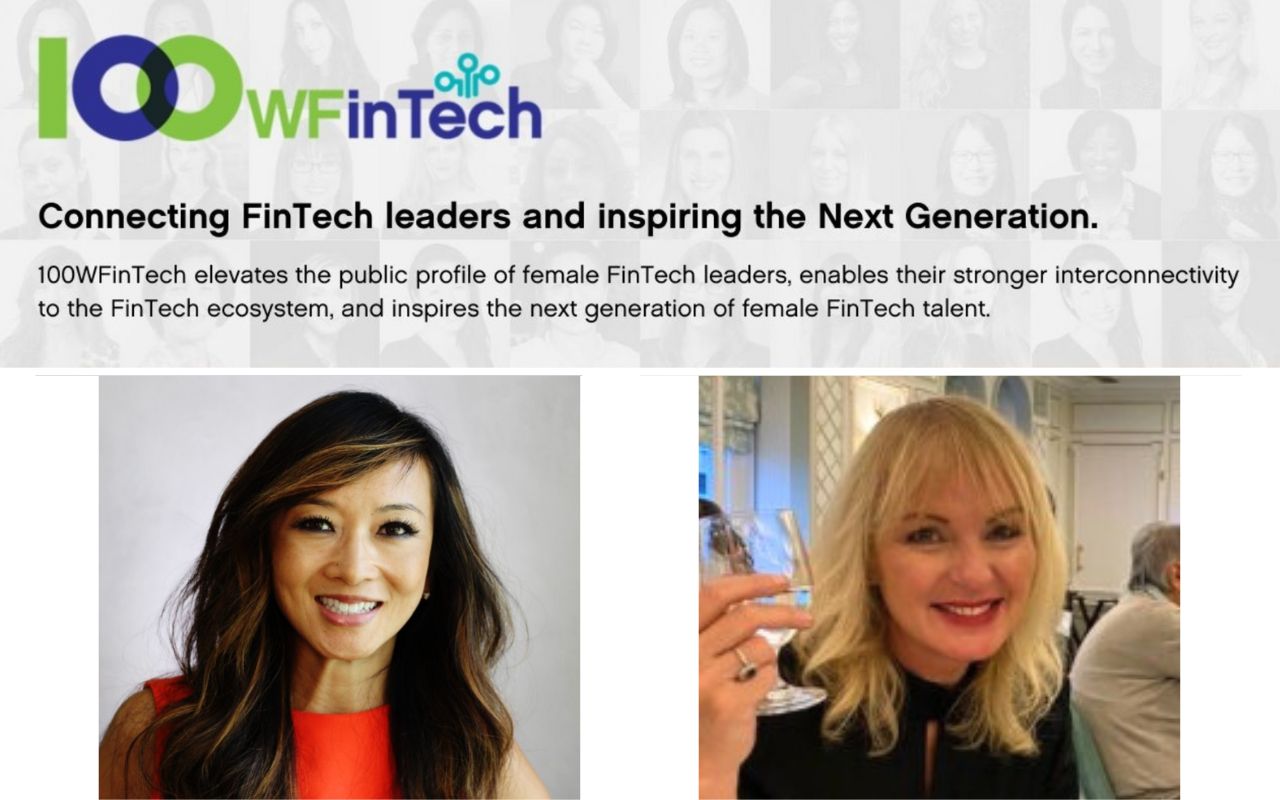 Worldwide, women are leading the way in building and funding disruptive technologies in fintech to advance businesses, broaden access, reduce the disparity in wealth, and transform how people invest in digital assets. Many of these women are featured in 100WFinTech’s Public Directory and are the changemakers in their respective fields in FinTech.
Worldwide, women are leading the way in building and funding disruptive technologies in fintech to advance businesses, broaden access, reduce the disparity in wealth, and transform how people invest in digital assets. Many of these women are featured in 100WFinTech’s Public Directory and are the changemakers in their respective fields in FinTech.
In this 100WFinTech Changemakers series, we talk to Alice Chen about how she builds fintech advocacy and community building surrounding digital assets and blockchain and Jenny Knott about her fintech book Fintroduction: Blockchain, DLT and Crypto and her boardroom training practice.
We hope the stories of these female FinTech leaders can inspire the next generation of finance professionals to build a better and more inclusive world by leveraging technology. If these stories and missions resonate with you, please share them with your network, get in touch with us, or join the Public Directory.
Alice Chen, Cofounder and General Counsel, InvestaX, APAC
Top 10 Global Fintech Leaders award at Singapore Fintech Festival (SFF) 2022
Top 100 Fintech Leaders 2022 by Fintech Magazine
LinkedIn: https://www.linkedin.com/in/salicechen/details/experience/
First, we chat with Alice Chen, cofounder and general counsel of InvestaX and IX Swap, and Digital Financing Subcommittee chair of Singapore FIntech Association. InvestaX is a leading tokenization SaaS platform for real-world assets, providing a comprehensive one-stop shop for the issuance, custody, and trading and, most notably, is the world’s first automated market maker (AMM) solution purpose-built for security tokens or tokenized real-world assets (RWAs). The AMM, termed IX Swap, addresses pervasive illiquidity issues in the security token industry, which is valued at USD $7.5 trillion. IX Swap offers a low-cost, efficient solution for tokenized RWAs.
Alice is a Chinese-born American, licensed attorney in California, and entrepreneur. She spent more than 10 years practicing corporate and real estate law across multiple jurisdictions (Los Angeles, Shanghai, and Tokyo) with major international firms. Alice regularly teaches as a guest lecturer at Singapore Management University Academy in the following courses: Certificate in FinTech & Innovation and Introduction to Blockchain, Digital Assets and Cryptocurrency.
▪ ▪ ▪
Alice shares her insights and experiences as a first-time founder, in taking the leap from corporate to start-up life, and about the importance of advocacy work and building a supportive community in the pursuit of personal and professional success
▪ ▪ ▪
Why did you decide to contribute your time to help build the fintech community in Asia?
I have always found myself drawn to the big forces that will shape the future for decades to come.The inspiration for the book formed along my habitual future gazing. Being an investor is all about predicting the future and its financial impact. We predict everything from inflation next month to new product launches by companies. If we take a step back and look at the really big picture, technology is among the most disruptive forces out there. We can’t paint a picture of the future without understanding its impacts.
At a more personal level, I also wondered how my job, income and household wealth would be affected by these great new forces. As I started asking these questions, I realized they are shared by many. Much has been discussed about the technical and the business potentials of technologies. Yet little has been said about their economic impact on working individuals. So I started to put words into computers and the rest is history.
As a Fintech leader, we have a unique opportunity to advocate for policies and practices that support innovation and protect consumers while ensuring responsible and sustainable growth, and it is for these reasons that I volunteer a lot of my time to industry associations and advocacy work. I believe in active citizenship and have always contributed my time to issues and causes I feel passionate about (e.g., empowering women, financial inclusion). Excited by technology’s impact on every aspect of life and a believer in blockchain and building tech that creates a new, better, and more inclusive investment universe, I spend a significant amount of my spare time educating and mentoring the Fintech community and ecosystem.
I have shared insights on FinTech, blockchain, and digital assets with a diverse audience, including university students, working professionals, and regulators, through guest lecturing and teaching accredited courses to finance professionals. These sessions provide a structured learning platform, enhancing participants’ knowledge and understanding of emerging technologies. By reaching thousands of individuals across various educational programs, I can help contribute to the increase in awareness and comprehension of blockchain and FinTech.
Given my legal background and practical experience, I contribute to the legal community as a member of TechGC—a global community of legal professionals in tech/Fintech. I also actively contribute my time as a mentor to the Fintech and blockchain communities, supporting initiatives such as She Starts Up and Tezos APAC EGG Web3 Incubator to play my part in empowering the next generation of Web3 founders.
Through my involvement in these organizations, I can do my part in advocating for the right kind of legislation and helping with the education so needed in this space. Giving back to the community in these ways is immensely rewarding in both a personal and professional capacity; knowing my contributions are helping shape the future of finance and hopefully leaving a positive impact by increasing awareness and improving industry practices and fostering a more informed, collaborative, and empowered FinTech ecosystem gives me a profound sense of satisfaction.
What have you learned in your entrepreneurial journey about building a Fintech community? If you could redo the process, is there anything you would change?
Building a community is a two-way street. Offering support and mentorship to fellow entrepreneurs can create a network of trusted relationships that may pay dividends in the future.
Pioneering in a new industry often involves overcoming substantial challenges, and because many things are being done for the first time, there are often no precedents, no one to follow, and no one else to advise you, and the path can be very lonely sometimes. In my journey as a FinTech leader, I’ve faced and conquered multiple challenges by leveraging my community and support network and by sheer determination and perseverance. Part of my journey has been the amazing learnings I gain from peers and others around me in the Fintech community, sharing similar war stories in the start-up trenches and getting affirmation and support from the community to keep going.
There has been a lot of growth and personal development in my journey as a Fintech founder. I’ve learned to look at issues in different ways, be challenged every day, never be told it can’t be done, and find creative ways to solve problems. With my work, I gain an immense sense of purpose knowing I may be helping lay the breadcrumbs or foundation of a new financial system. Every day is a learning experience for me and my team, especially in an industry and technology changing as rapidly as blockchain and digital assets. There are many unknowns, much uncharted waters, and a lot of regulatory uncertainty, but it is this same excitement of learning something new and interesting that has kept us going, knowing we are paving our own path, and doing something new that is helping shape the future of finance.
What did not make it to your entrepreneurship in Asia?
Entrepreneurship means breaking the mold and doing something out of your comfort zone, doing something for the first time, and going against the conventional wisdom. I have learned we are all capable of a lot more than we think. The fact that I decided to start my first entrepreneurial journey with my husband in a nascent industry, and we are still married by the way, hopefully means that it can work.
What would you do if you were not doing what you are doing?
I’ve always loved policy work. Part of the reason I went to law school and became a lawyer was because of the idealistic view that I can change the world for the better. Whatever I do next, I would want it to have a positive environmental impact and address issues such as climate change, and I would invest in our planet.
What advice would you give to someone wanting to follow a similar path?
You have to extract value out of everything you do; otherwise, it’s a waste of time, and it has to be more than just monetary value. There is no paycheck in the community work I do, and sometimes there may not be a “big exit” from your start-up. If you want to go down this path, you have to love what you do, build something people want, and be humble and realistic.
There is this saying, “love what you do, and you will never work a day in your life.” The reality is if you love what you do, you end up doing more of it. You may not consider it “work,” but it’s still time away from all of the other demands of life, so you better love what you do!
The journey and profound sense of purpose that come with building something new, building a team, innovating, and getting up and doing something exciting each day, which also has a transformative impact and potentially leaves a legacy, is something a big paycheck can’t replace.
What is the biggest takeaway you want to leave with the reader at 100 Women in Finance/100WFinTech?
At Founders Peak at the Singapore Fintech Festival, I spoke about this innate desire for a quest ingrained in us from the beginning of our time as voyagers, explorers, and inventors. This thirst for a mission, this yearning for a quest, is why a lot of founders grind it out and do what we do. We are setting our own precedents and creating world-first projects at our company, from creating the first blockchain native fund called Project eVCC, which was supported by the regulators in Singapore, to tokenizing our own ESOP, to launching the first AMM for security tokens.
I have been called an idealist at times, and in my professional life, access to finance and financial inclusion is something I want to promote. This is where my entrepreneurial journey stems from, but it grew from there to embracing new technologies and pushing boundaries. I was still too young to do something meaningful when Web 1.0 was introduced and too focused on building my career to care about Web 2.0. Now I feel like I have the opportunity (we all have the opportunity) to be at the beginning of Web 3.0 and to participate in and have a major impact on the development of a new financial system.
 Jenny Knott, cofounder, BoardGames, Immersive Training; nonexecutive director: British Business Bank, Simply Health, Gresham Technologies PLC and Salary Finance Ltd.
Jenny Knott, cofounder, BoardGames, Immersive Training; nonexecutive director: British Business Bank, Simply Health, Gresham Technologies PLC and Salary Finance Ltd.
Website: https://www.ftadvisory.co.uk/education
LinkedIn: https://www.linkedin.com/in/jenny-knott-fcca-29185710/
Then we chat with Jenny Knott, a former CEO of an investment bank with over 35 years’ experience and a leading innovator in financial technologies and champion of female talent. Jenny has extensive prudential board experience, having served on boards of global investment banks, FinTechs, and charitable organizations for over 25 years, her roles ranging from CEO, CFO, COO, and chair to member of the board, board audits, board risk, RemCo, and technology subcommittees. Jenny is cofounder of FinTech Strategic Advisors and assists clients with their FinTech investment and adoption strategies; she also supports start-ups in achieving scale and commercial success. Jenny recently launched a board immersive training practice to mentor women to be highly effective in the boardroom. Jenny is a public speaker on emerging FinTech including digital assets and technologies as well as the commercial benefits of truly innovative and inclusive board and corporate cultures.
▪ ▪ ▪
Jenny will talk about her book, Fintroduction: Blockchain, DLT, and Crypto and her boardroom training practice.
▪ ▪ ▪
Why did you write this book?
I wrote the book back in 2018 to educate and evangelize this next generation on technological innovation and the board game IMMERSIVE training comes from the same motive: educating women to be successful in the boardroom using innovative techniques.
What have you learned in the process? If you could redo the process, is there anything you would change?
At the time of publishing, I honestly believed my audience was ready to hear about this radical development and would embrace Blockchain, DLT, and crypto. How wrong was I! Convincing the non-crypto community to think and do things differently has been really challenging. The inertia to adopt required me to pursue education and evangelism first, thereby addressing the prejudice to change the status quo. Similarly, getting female talent to be ready for the boardroom as founders of FinTechs required a different approach, and hence, the BoardGame immersive training evolved. The lesson was education addresses (sub)conscious fears regarding progression.
What did not make it into the book?
On the back of new tech and what is effectively a new sector comes new bad actors and practices. I included health warnings but did not recognize the scale of fraud that would emerge (down to human behavior rather than just because of the tech!).
What would you do if you were not doing what you are doing?
I believe in lowering the drawbridge and encouraging talent to be more entrepreneurial and courageous, so I’d probably lecture more!
What advice would you give to someone wanting to follow a similar path?
It’s important to embrace change and keep an open mind on emerging trends—so keep learning, keep experimenting, and keep collaborating.
What is the biggest takeaway you want to leave with the reader at 100 Women in Finance/100WFinTech?
Being purposefully sustainable requires continuous innovation—actually doing things differently is vital. However, Financial Services’ willingness to adopt and adapt is challenging! Improve your influencing skills, embrace new technologies, and learn how to play the game!
Upcoming and recently completed events organized or cohosted by 100WFinTech are as follows:
- November 2–3, 2023, Hong Kong, China—Hong Kong Fintech Week. 100WF as supporting organization.
- November 7, 2023, London, UK—Scaling Fintech Globally: Navigating Challenges and Seizing Opportunities. Speakers from SteelEye, Remote and Tunic, and Nova Credit. Sponsored by EY.
- November 15, 2023, New York, USA—Bank–Fintech Partnerships: Avoiding Pitfalls. Speakers from Goldman Sachs, Alloy, Citizens Bank, Davis Wright Tremaine, and Fingercheck. Sponsored by Davis Wright Tremaine.
- November 15–17, Singapore—Singapore FIntech Festival. 100WF as community partner.
This is the third article of our Changemakers in FinTech series. In the future, we will continue to feature FinTech book authors, TED talkers, lecturers, and influencers from around the world
If you are interested in partnering with us at 100 Women in FinTech, please visit our website and contact us here.


